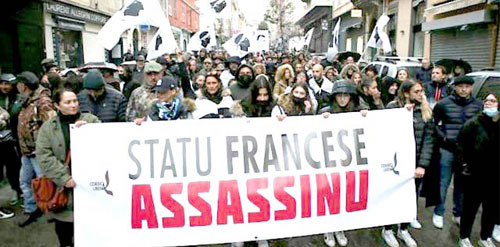The French government called for calm on Monday after fierce clashes left dozens of demonstrators and police injured on the island of Corsica, where anger over the assault in prison of a nationalist figure has reached boiling point. Police reported 67 people injured during protests on Sunday, including 44 police, following scenes that onlookers described as akin to urban guerilla war.
Yvan Colonna, who is serving a life sentence for the assassination in 1998 of Corsica’s top regional official, Claude Erignac, has been in a coma since being beaten on March 2 in jail by a fellow detainee, a convicted jihadist. The incident has stoked anger on the island, where some still see Colonna — who was arrested only in 2003 after a five-year manhunt that eventually found him living as a shepherd in the Corsican mountains — as a hero in a fight for independence.
Demonstrations and riots have been ongoing since the prison attack, which protesters blame on the French government. “French government murderers”, read placards at Sunday’s demonstrations, which brought an estimated between 7,000 and 10,000 people into the streets.
Colonna was jailed in the south of France. The authorities have long rejected his demand to be transferred to Corsica, saying his offence made him a special status detainee. In a bid to ease tensions, Prime Minister Jean Castex last week removed this status. He also said he would allow the transfer of two other convicted members of the hit team that killed Erignac to Corsica but the move failed to placate their supporters.
Up to 300 masked young demonstrators used Molotov cocktails and rocks against police, who in turn deployed teargas and water cannon in the clashes that broke out in the afternoon and lasted late into the evening. Prosecutor Arnaud Viornery told AFP that police had told the local population to remain indoors in the town of Bastia, where protesters set the tax office on fire with firebombs.
Corsica, one of the Mediterranean’s largest islands, has been French since the 18th Century. It is known as the “Island of Beauty” because of its unspoiled coastlines, spectacular beaches and mild climate, which have made it popular with tourists, who are the island’s main source of income. But there have also been constant tensions between independence-seeking nationalists and central govt.—Agencies










